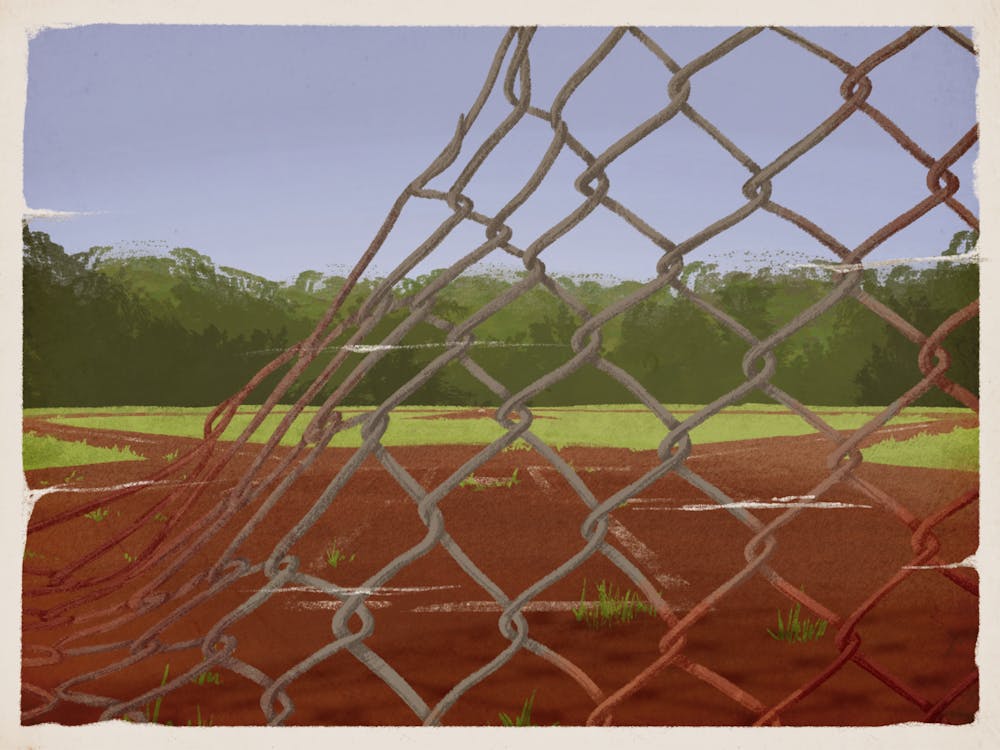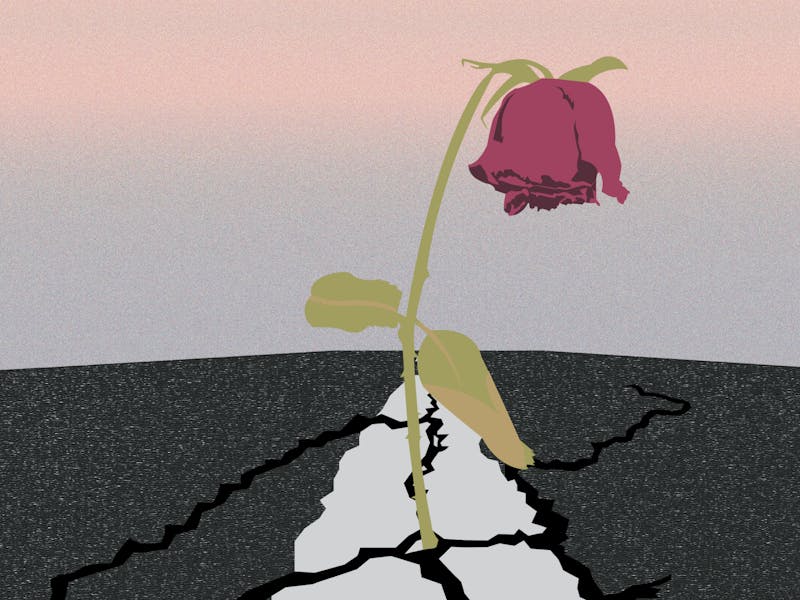I'd say someone stole the bases, but "stole" gives them too much presence. No, they were Lot's-wifed, atomic-flashed, poofed. No holes in the infield, no white indents. I trotted through the vacant dirt without looking down.
* * *
It was pointless to say that Runnemede Field had aged since Pop's day. As if the weed-woven fence, or the rust-jagged chainlink, or the repaved trio of adjacent basketball courts didn't give it away. On the dugout's rain-faded metal sign "est." was reduced to residue.
* * *
Looks like it needs a hot bath and a shave, I remember Dad saying.
Pop must have responded in one of three ways:
- He politely chuckles, then creaks the wobbly dugout door, then heads straight for the vacated home. Home plate, I mean.
- He gives a huh, as in yeah, I know, as in I know, asshole, then says something about how the field would be better off if we were still here to take care of it.
- He doesn't hear. Dad repeats the joke. He still can't hear it. Hey Dad, Dad says, have you ordered those hearing aids?
* * *
Palladas was a Greek pagan epigrammatic poet. He lived either near or just after Constantine, important because he might have, according to some scholars, seen Constantine's pagan purges. Especially his looting of pagan temples.
In Palladas' "On a Statue of Heracles," he describes a broken Heracles bust on the dirt of a cross-roads. He doesn't say who broke it. This could be evidence of Constantine defiling public pagan monuments as well as private.
All of this is sampled from my Intro to History notes, taught by a professor who remarked that Palladas makes for "very poor and boring reading."
* * *
Pantoum poems recall memory. Follow this form: first, then second, then third, then fourth, then second, then fifth, then third… End with what you wrote first. Always.
Pantoum poems were all I wrote in high school. I had one about seasons, another about my hometown's history, another about Pop's death, another about history…
Epigrams don't recall shit. They describe something that's gone, and it's gone.
* * *
If we were still here to take care of it. "We," as Pop describes them: Allen Banks (who later clerked for that asshole Rehnquist), Joe Westbrook (remember him from the party? the one with the cane?), Ernie Carter (haven't seen him since our first high school reunion), ah…who else…oh yeah, Tim Petry (don't know what he's up to), and Bill Holsapple, the one none of you will meet. He died in Saigon just as I entered college.
* * *
I must have walked to the infield in one of two ways:
- Pop leans against the chain link so I can hear him from the dugout. Hey Paul, he says, come out and play. I walk towards the fence's opening with my hands in my pockets. Come on, says my Dad, experiment, have fun. Go and run the bases.
- I imagine 1952, Pop playing hot corner on some July day, wearing the beat-up leather glove, the one Dad passed to me at the wake. I start walking.
* * *
Palladas, "Epigram 82":
Is it not true that we are dead and only seem to live, we Greeks, fallen into misfortune, fancying that a dream is life? Or are we alive and is life dead?
* * *
Another one of my early poems: "Life and Death." I wrote it after an English teacher's prompt. Compare two things, thing one in stanza one, thing two in stanza two. Then, in stanza three, find some way to bring them together.
For life I put some obvious middle-school fascinations: ice cream, all night gaming sessions, Christmas presents, hugs from grandma. I can't remember anything else. Except for the first line of stanza two. And death is beautiful, it read.
* * *
Runnemede Field has lost its chalked foul lines, its pitcher's rubber, all of its bases. The symbols of baseball have been dry-erased by decades. And millennia later, when it will be dug up by a generation even less recognizable, analysts will spend years deciphering this summertime ritual. In the stacks of their libraries, future scholars will choose what the field could be evidence for. Key words: could be.
Meanwhile, my shoes press imprints where second base once was. The past: piles of packed particles stomping lost chalk under grass. The past: busted leather-laced mitts shoved in my hands at wakes.
* * *
Palladas, "On a Statue of Heracles":
I marveled seeing at the crossroads Jove's brazen son, once constantly invoked, now cast aside, and in wrath I said: "averter of woes, offspring of three nights, thou, who never didst suffer defeat, art today laid low." But at night the god stood by my bed smiling, and said: "Even though I am a god I have learnt to serve the times."
* * *
I definitely remember what Pop told me on the car ride home:
The neighborhood developer built that park when the first houses were built. I met his family at his memorial. They said he wanted a place for all the younger folks in the development. He wanted somewhere where the children could play.



